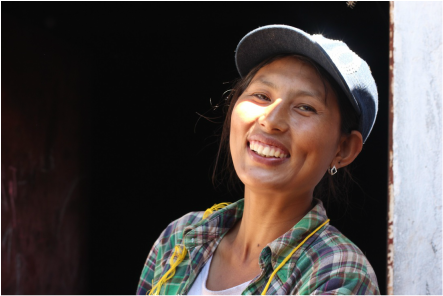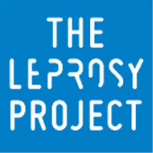 photo by Isobel Caldwell
photo by Isobel Caldwell Wazhaerluomo is 31 years old and she lives in the Xide village. She is a single mother of four, so she has many responsibilities, including caring for her children, her parents, who also live in the village, and the family livestock. When her first husband passed away, his family arranged for Wazhaerluomo to remarry his younger brother. Her second husband also passed away, and now she is unable to re-marry because many of the villagers believe her to be cursed.
One year, she won the beauty contest in the torch festival, although she can’t remember how long ago this was. She doesn’t think of herself as beautiful, and feels quite shy and embarrassed when talking about it. Every Yi girl has a selection of traditional dresses, so on the day, she chose the one that she thought was the nicest and put it on, without any special preparations.
She is able to speak some Mandarin, having learned it while working in an electrical factory in Jiangsu to make money for her family as the sole breadwinner. She found that being in the factory made looking after her family much too difficult, so she moved back to the village after four months. It was too much to expect four children under the age of 12 and two elderly people to care sufficiently for themselves in her absence.
After the embroidery teachers came to the village eight years ago to teach the women Yi embroidery skills, she would make embroidery pieces in her free time. She enjoyed practicing and improving her sewing skills when she could.
“Sometimes my life can become quite busy having to maintain the household and care for everyone, but I love doing embroidery because it is fun and when I finish a piece, it gives me a great sense of accomplishment. Sometimes I have too many other responsibilities and can only half finish a piece, which is disappointing, but I still love to reap the benefits of doing the physical work myself, as well as be able to earn some money from it.”
Her happiest days were when she was young and carefree, but now she has a lot of burdens to bear. When she was younger, it was just her parents she had to care for, but at the time they were still young and independent so there was not as much that she had to do. Now, without a husband, and with two elderly parents and four children to look after, her life seems constantly tiring and busy.
The embroidery has given her a good opportunity to become independent and make her own money and she is able to do one to two embroidery pieces a day.
She sometimes makes clothing for herself and her children, but otherwise buys their clothes. Last year, she started to make her own traditional Yi outfit. So far she has made the three-piece shirt, but wishes to continue on and make the trousers. They take about one year to complete and often are decorated with real silver, so they will also cost a fair amount of money to make. The price to buy an already made pair of traditional Yi trousers can be up to 10,000 RMB from a store or tailor.
She says that her children are all very helpful and obedient at the moment, but she is not sure what they may be like in the future. She hopes that her children will all continue to go to school, receive an education and become self-sufficient and independent, allowing them to grow as people and have futures with more opportunities. She is very thankful to the project for helping them because she is now able to make these pieces and earn an income for her and her family without having to move away and work in a factory She is grateful that the embroidery helps her provide an education for her children.
interview and translation by Georgie Reading
Edited by Idobel Caldwell
One year, she won the beauty contest in the torch festival, although she can’t remember how long ago this was. She doesn’t think of herself as beautiful, and feels quite shy and embarrassed when talking about it. Every Yi girl has a selection of traditional dresses, so on the day, she chose the one that she thought was the nicest and put it on, without any special preparations.
She is able to speak some Mandarin, having learned it while working in an electrical factory in Jiangsu to make money for her family as the sole breadwinner. She found that being in the factory made looking after her family much too difficult, so she moved back to the village after four months. It was too much to expect four children under the age of 12 and two elderly people to care sufficiently for themselves in her absence.
After the embroidery teachers came to the village eight years ago to teach the women Yi embroidery skills, she would make embroidery pieces in her free time. She enjoyed practicing and improving her sewing skills when she could.
“Sometimes my life can become quite busy having to maintain the household and care for everyone, but I love doing embroidery because it is fun and when I finish a piece, it gives me a great sense of accomplishment. Sometimes I have too many other responsibilities and can only half finish a piece, which is disappointing, but I still love to reap the benefits of doing the physical work myself, as well as be able to earn some money from it.”
Her happiest days were when she was young and carefree, but now she has a lot of burdens to bear. When she was younger, it was just her parents she had to care for, but at the time they were still young and independent so there was not as much that she had to do. Now, without a husband, and with two elderly parents and four children to look after, her life seems constantly tiring and busy.
The embroidery has given her a good opportunity to become independent and make her own money and she is able to do one to two embroidery pieces a day.
She sometimes makes clothing for herself and her children, but otherwise buys their clothes. Last year, she started to make her own traditional Yi outfit. So far she has made the three-piece shirt, but wishes to continue on and make the trousers. They take about one year to complete and often are decorated with real silver, so they will also cost a fair amount of money to make. The price to buy an already made pair of traditional Yi trousers can be up to 10,000 RMB from a store or tailor.
She says that her children are all very helpful and obedient at the moment, but she is not sure what they may be like in the future. She hopes that her children will all continue to go to school, receive an education and become self-sufficient and independent, allowing them to grow as people and have futures with more opportunities. She is very thankful to the project for helping them because she is now able to make these pieces and earn an income for her and her family without having to move away and work in a factory She is grateful that the embroidery helps her provide an education for her children.
interview and translation by Georgie Reading
Edited by Idobel Caldwell

 RSS Feed
RSS Feed
